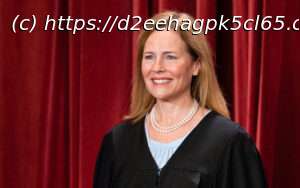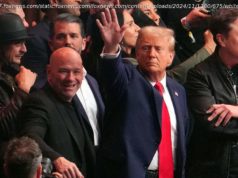Justice Amy Coney Barrett’s majority opinion includes significant efforts, and violates some of her own precepts against excessive reliance on questionable history.
In its important recent immigration decision in Department of State v. Munoz, the Supreme Court ruled there are virtually no constitutional limits on the federal government’s power to bar non-citizen spouses of American citizens from entering the country. In the process, Justice Amy Coney Barrett’s majority opinion (written on behalf of herself and the five other conservative justices) commits serious errors in historical analysis, and violates Justice Barrett’s own well-taken strictures about the appropriate use of history in constitutional analysis.
Sandra Munoz is a US citizen whose husband, Luis Asencio-Cordero (a citizen of El Salvador) was barred from entering the US to come live with her, because US consular officials claimed he had ties to the MS-13 criminal drug gang (which connectoin Ascencio-Cordero denies). Munoz filed suit, claiming that, given that the constitutional right to marriage was implicated, the State Department was at the very least required to reveal the evidence that supposedly proved her husband’s connection to the gang.
In arguing that there is no originalist or historical justification for US citizens to claim a right to entry for their non-citizen spouses, Justice Barrett cites historical evidence from the 1790s:
From the beginning, the admission of noncitizens into the country was characterized as „of favor [and] not of right.“ J. Madison, Report of 1800 (Jan. 7, 1800)…. (emphasis added); see also 2 Records of the Federal Convention of 1787, p. 238 (M. Farrand ed. 1911) (recounting Gouverneur Morris’s observation that „every Society from a great nation down to a club ha[s] the right of declaring the conditions on which new members should be admitted“); Debate on Virginia Resolutions, in The Virginia Report of 1799–1800, p. 31 (1850) („[B]y the law of nations, it is left in the power of all states to take such measures about the admission of strangers as they think convenient“). Consistent with this view, the 1798 Act Concerning Aliens gave the President complete discretion to remove „all such aliens as he shall judge dangerous to the peace and safety of the United States.“ 1 Stat. 571 (emphasis deleted). The Act made no exception for spouses—or, for that matter, other family members.
Almost everything in this passage is either false or misleading. The quote from James Madison’s Report of 1800, does not, in fact, indicate that Madison believed the federal government has blanket authority to exclude immigrants for whatever reason it wants. Far from it. Madison was arguing that the Alien Friends Act of 1798 (part of the notorious Alien and Sedition Acts) was unconstitutional because the federal government lacks such power. Here is the passage where the quote occurs:
One argument offered in justification of this power exercised over aliens, is, that the admission of them into the country being of favor not of right, the favor is at all times revokable.
To this argument it might be answered, that allowing the truth of the inference, it would be no proof of what is required. A question would still occur, whether the constitution had vested the discretionary power of admitting aliens in the federal government or in the state governments.
Note that Madison does not even admit that admission of immigrants is „a favor.“ He just assumes it is for the sake of argument, then goes on to argue that the Alien Act is unconstitutional regardless, because the relevant power isn’t given to the federal government (this is what he argues in the rest of the Alien Act section of his Report). The 1798 Act Concerning Aliens, also quoted by Justice Barrett, is the very same Alien Friends Act denounced as unconstitutional by Madison, Thomas Jefferson, and many others. Opposition to the Act was so widespread that no one was ever actually deported under it, before Thomas Jefferson allowed it to expire upon becoming president in 1801.
I think Jefferson and Madison were right to argue the Alien Friends Act was unconstitutional. But, at the very least, legislation whose constitutionality was so widely questioned at the time cannot be relied on as strong evidence of the original scope of federal power in this area.
Start
United States
USA — mix The Supreme Court's Dubious Use of History in Department of State v....






